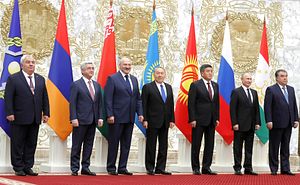It’s been a tense two months between Kazakhstan and Kyrgyzstan, but the two presidents — Nursultan Nazarbayev and Sooronbai Jeenbekov — met on November 30 on the sidelines of the Collective Security Treaty Organization (CSTO) summit in Minsk, Belarus and discussed the resolution of the border situation.
In early October, Kazakhstan imposed greater controls on the Kyrgyz border after former Kyrgyz President Almazbek Atambayev fired off a string of insults aimed at Nazarbayev. The Kazakh president had met with Kyrgyz presidential candidate Omurbek Babanov, which irked Atambayev. Atambayev’s party compatriot, Sooronbai Jeenbekov, eventually won the election (and had met with Nazarbayev in August before resigning the prime minister post to run for president). In addition to accusing Kazakhstan of meddling in the Kyrgyz election, in the final two months of his presidency Atambayev also called Nazarbayev an “aged dictator” and other, more colorful, terms.
Astana claimed the increased border controls were necessary given rampant smuggling of Chinese goods through Kyrgyzstan, avoiding EEU tax regimes. While this is perhaps at least partially true, the imposition of greater restrictions had a political trigger and, as we’ll see, a political solution.
Kazakhstan’s increased border controls led to a slowdown in trade which Bishkek said, as reported by Eurasianet, has done about $14.3 million in damage to the Kyrgyz economy.
The Minsk meeting between Nazarbayev and Jeenbekov featured the necessary positive diplomatic language.
Nazarbayev said it was “indispensable” that Kazakhstan and Kyrgyzstan “restore the family and brotherly ties between our two counties. This is in the interests of our people. This is the desire of our peoples.”
The two presidents agreed to update and sign a “roadmap” which had been floated, but not agreed upon, in late October. The border restrictions, however, are supposed to loosen sooner.
According to the Astana Times, a pro-government Kazakh media site, the loosening of restrictions, “was the result of Kyrgyzstan agreeing to a 41-point roadmap regulating transport, phytosanitary and veterinary control and customs and tax administration…”
One has to wonder if Bishkek regrets rejecting the $100 million in aid Astana had committed to sending south for exactly the kind of improvements in the roadmap.
In any case, this certainly looks like a rapprochement, at least from the top. Kyrgyz exporters will still have to grapple with the impact of the two-month mini trade war on their balance sheets. Furthermore, public sentiment can be slower to recover than high-level diplomatic connections.
The day before Nazrabayev and Jeenbekov met in Minsk to play nice, a Kazakh state broadcaster aired an inflammatory documentary about the 2010 Kyrgyz revolution. According to Eurasianet, the documentary run by Khabar TV on November 29 — titled “Mission Peacemaker: The Kyrgyz Rift” — posited Nazarbayev’s intervention in the situation as key in avoiding an outright civil war in Kyrgyzstan.
“It was [Nazrabayev], the documentary explains, that provided the plane that flew Bakiyev out of Kyrgyzstan into exile — first to the southern Kazakhstan city of Taraz and then to Belarus — thereby defusing the intensifying crisis.”
The documentary then featured an interview with Bakiyev, who has been sentenced to life in prison in absentia for the nearly 100 deaths that occurred during the revolution.
Activists protested in front of the Kazakh embassy in Bishkek on November 30. According to RFE/RL, some brought boxes of underwear as Bakiyev said in the documentary interview that when he left Kyrgyzstan he left everything, including his underwear behind.
It’s inevitable that the Kazakhstan-Kyrgyzstan relationship will return to normal, in time. But this incident underscores just how easy it is for Kazakhstan to push back on Kyrgyzstan, especially in matters of trade within the Eurasian Economic Union. This could, perhaps, motivate Bishkek to further diversifying its partnerships, most importantly in helping nurture the relationship with Tashkent that has so recently been repaired.

































